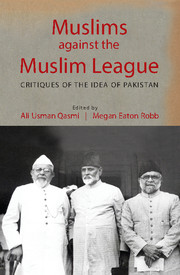Book contents
- Frontmatter
- Contents
- Acknowledgements
- Introduction
- 1 Maulana Husain Ahmad Madani and the Jami'at ‘Ulama-i- Hind: Against Pakistan, against the Muslim League
- 2 The Partition Conundrum: Perspectives, Experiences and Ambiguities from qasbahs in India
- 3 Choudhary Rahmat Ali and his Political Imagination: Pak Plan and the Continent of Dinia
- 4 Differentiating between Pakistan and Napak-istan: Maulana Abul Ala Maududi's Critique of the Muslim League and Muhammad Ali Jinnah
- 5 Advising the Army of Allah: Ashraf Ali Thanawi's Critique of the Muslim League
- 6 The Illusory Promise of Freedom: Mian Iftikhar-ud-Din and the Movement for Pakistan
- 7 Visionary of Another Politics: Inayatullah Khan ‘al-Mashriqi’ and Pakistan
- 8 Nonviolence, Pukhtunwali and Decolonization: Abdul Ghaffar Khan and the Khuda'i Khidmatgar Politics of Friendship
- 9 Islam, Communism and the Search for a Fiction
- 10 Muslim Nationalist or Nationalist Muslim? Allah Bakhsh Soomro and Muslim Politics in 1930s and 1940s Sindh
- 11 Dancing with the Enemy: Sikander Hayat Khan, Jinnah and the Vexed Question of ‘Pakistan’ in a Punjabi Unionist Context
- 12 Religion between Region and Nation: Rezaul Karim, Bengal, and Muslim Politics at the End of Empire
- 13 ‘The Pakistan that is going to be Sunnistan’: Indian Shi'a Responses to the Pakistan Movement
- 14 The Baluch Qaum of Kalat State: Challenging the Ideological and Territorial Boundaries of Pakistan
- Contributors
- Index
12 - Religion between Region and Nation: Rezaul Karim, Bengal, and Muslim Politics at the End of Empire
Published online by Cambridge University Press: 28 February 2018
- Frontmatter
- Contents
- Acknowledgements
- Introduction
- 1 Maulana Husain Ahmad Madani and the Jami'at ‘Ulama-i- Hind: Against Pakistan, against the Muslim League
- 2 The Partition Conundrum: Perspectives, Experiences and Ambiguities from qasbahs in India
- 3 Choudhary Rahmat Ali and his Political Imagination: Pak Plan and the Continent of Dinia
- 4 Differentiating between Pakistan and Napak-istan: Maulana Abul Ala Maududi's Critique of the Muslim League and Muhammad Ali Jinnah
- 5 Advising the Army of Allah: Ashraf Ali Thanawi's Critique of the Muslim League
- 6 The Illusory Promise of Freedom: Mian Iftikhar-ud-Din and the Movement for Pakistan
- 7 Visionary of Another Politics: Inayatullah Khan ‘al-Mashriqi’ and Pakistan
- 8 Nonviolence, Pukhtunwali and Decolonization: Abdul Ghaffar Khan and the Khuda'i Khidmatgar Politics of Friendship
- 9 Islam, Communism and the Search for a Fiction
- 10 Muslim Nationalist or Nationalist Muslim? Allah Bakhsh Soomro and Muslim Politics in 1930s and 1940s Sindh
- 11 Dancing with the Enemy: Sikander Hayat Khan, Jinnah and the Vexed Question of ‘Pakistan’ in a Punjabi Unionist Context
- 12 Religion between Region and Nation: Rezaul Karim, Bengal, and Muslim Politics at the End of Empire
- 13 ‘The Pakistan that is going to be Sunnistan’: Indian Shi'a Responses to the Pakistan Movement
- 14 The Baluch Qaum of Kalat State: Challenging the Ideological and Territorial Boundaries of Pakistan
- Contributors
- Index
Summary
The Congress politician Rezaul Karim (1902–93), a prominent Muslim from Calcutta who actively critiqued the idea of Pakistan as it was being developed in the 1930s and 1940s, occupies a curious place in the history of Muslim India. As one of the most vocal Muslims who questioned the very idea of the Muslim League from the region of Bengal, a central place from which the debates on the future of an independent India and/or Pakistan occurred in the late colonial period, Karim illustrates the rarely studied condition of Muslim politicians in late colonial India who both identified deeply with the language of Bengali, and its associated literatures and cultures, as well as with Islam as a basis for a composite nationalism. Scholarly attention to Muslims ‘against the Muslim League’ has tended to focus on those personalities and individuals whose contemporary appropriations spring from the vantage point of India and Pakistan's own vexed relationship with Islam and its place in Indian history as well as the nature and meaning of the emergence of Pakistan. Such personalities have included three particular subjects: politicians associated with the ideological formation of Pakistan, such as Muhammad Ali Jinnah (1876-1948), philosophers of Islam and modernity, such as Muhammed Iqbal (1877-1938) or Muslim Indian nationalists, such as Maulana Abul Kalam Azad (1888-1958) and Maulana Hussain Ahmad Madani (1879-1957). Perhaps because of the emergence of Bangladesh in 1971, the politics of Muslims from Bengal who identified with a regional Bengali identity alongside an Indian Muslim nationalism has found almost no presence in the historiography, given its odd fit with the later history of East Pakistan (1947-1971) and the state of Bangladesh as it later became. Through an analysis of Rezaul Karim's political biography, with particular attention to his relationship between an all-India ethos, a composite nationalism based on Islam, and Bengali regional identity, this essay argues that Rezaul Karim developed a Bengali Muslim composite nationalism that aimed to connect religion, region and nation in the context of a subjunctive, possible future India.
Biography
Born in 1902 in Birbhum in West Bengal, Karim followed the path of the rising generation of the Muslim middle classes of the early nineteenth century by studying both at the Calcutta Madrasa as well as the hallowed halls of Calcutta University in the 1920s and 30s.
- Type
- Chapter
- Information
- Muslims against the Muslim LeagueCritiques of the Idea of Pakistan, pp. 338 - 349Publisher: Cambridge University PressPrint publication year: 2017
- 1
- Cited by

